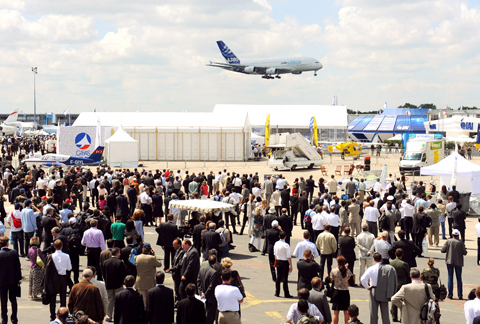Asian and low-cost airlines defied worries about the global recession and placed dozens of orders with Airbus at the Paris Air Show, in sharp contrast to rival Boeing, which reported no new sales.
Planemakers at the world’s biggest air show are trying to coax airlines and governments to open their pocketbooks and buy more aircraft despite plunging passenger loads and revenues.
Airbus CEO Tom Enders declared that Tuesday’s sunny skies — after pelting rain on Monday’s opening day — boded well for business.

PHOTO: BLOOMBERG NEWS
Airbus announced two firm orders from Vietnam Airlines and the Philippines low-cost airline Cebu Pacific worth US$1.8 billion on Tuesday. Vietnam Airlines ordered 16 Airbus A321 single-aisle jets worth US$1.4 billion and pledged to buy two more A350-XWB planes.
The airline made a deposit and signed a memorandum of understanding for the two A350 planes, which falls short of a firm sale and means Airbus does not count the order in its overall tally.
Cebu Pacific made a firm order for five single-aisle A320s worth a total of US$385 million at list prices. Airlines often negotiate substantial discounts to catalog prices, particularly in tough economic times.
Kuala Lumpur low-cost airline Air Asia ordered 10 A350-900 jets and placed options for five more. The list price for the 10 jets would be US$2.4 billion.
Boeing’s vice president for international corporate communications, Charlie Miller, shrugged off the Airbus announcements.
“Airbus and Boeing approach air shows in a different way. Boeing doesn’t save up orders to announce at air shows. That has been our policy for years. Our policy is to announce orders as soon as they are firm,” he said.
Boeing has sought to concentrate on its military programs. The head of its air refueling tanker programs expressed confidence in the US jet manufacturer’s chances to win the rematch with Airbus’ parent EADS for a multibillion-dollar contract with the US Air Force.
Boeing vice president Dave Bowman said his team was “pumped and ready to rock” when the Air Force issues its request for offers in the coming weeks.
Both rivals sought to minimize expectations this year amid worries about credit markets, the global economy and the unexplained crash of Air France Flight 447.
“This is not the time to expect huge orders, but there are still orders coming in because the situation is different from region to region” and company to company, Enders told a news conference. “What counts for our numbers, our financial health, is not orders but turning our backlog into delivery.”
He also sought to reassure its thousands of workers amid cutbacks across the aviation industry.
“We are very much interested in keeping stable the most important asset we have in our company ... our skilled workforce,” he said.

The US government has signed defense cooperation agreements with Japan and the Philippines to boost the deterrence capabilities of countries in the first island chain, a report by the National Security Bureau (NSB) showed. The main countries on the first island chain include the two nations and Taiwan. The bureau is to present the report at a meeting of the legislature’s Foreign Affairs and National Defense Committee tomorrow. The US military has deployed Typhon missile systems to Japan’s Yamaguchi Prefecture and Zambales province in the Philippines during their joint military exercises. It has also installed NMESIS anti-ship systems in Japan’s Okinawa

‘WIN-WIN’: The Philippines, and central and eastern European countries are important potential drone cooperation partners, Minister of Foreign Affairs Lin Chia-lung said Minister of Foreign Affairs Lin Chia-lung (林佳龍) in an interview published yesterday confirmed that there are joint ventures between Taiwan and Poland in the drone industry. Lin made the remark in an exclusive interview with the Chinese-language Liberty Times (the Taipei Times’ sister paper). The government-backed Taiwan Excellence Drone International Business Opportunities Alliance and the Polish Chamber of Unmanned Systems on Wednesday last week signed a memorandum of understanding in Poland to develop a “non-China” supply chain for drones and work together on key technologies. Asked if Taiwan prioritized Poland among central and eastern European countries in drone collaboration, Lin

ON ALERT: Taiwan’s partners would issue warnings if China attempted to use Interpol to target Taiwanese, and the global body has mechanisms to prevent it, an official said China has stationed two to four people specializing in Taiwan affairs at its embassies in several democratic countries to monitor and harass Taiwanese, actions that the host nations would not tolerate, National Security Bureau (NSB) Director-General Tsai Ming-yen (蔡明彥) said yesterday. Tsai made the comments at a meeting of the legislature’s Foreign Affairs and National Defense Committee, which asked him and Minister of National Defense Wellington Koo (顧立雄) to report on potential conflicts in the Taiwan Strait and military preparedness. Democratic Progressive Party (DPP) Legislator Michelle Lin (林楚茵) expressed concern that Beijing has posted personnel from China’s Taiwan Affairs Office to its

BACK TO WORK? Prosecutors said they are considering filing an appeal, while the Hsinchu City Government said it has applied for Ann Kao’s reinstatement as mayor The High Court yesterday found suspended Hsinchu mayor Ann Kao (高虹安) not guilty of embezzling assistant fees, reducing her sentence to six months in prison commutable to a fine from seven years and four months. The verdict acquitted Kao of the corruption charge, but found her guilty of causing a public official to commit document forgery. The High Prosecutors’ Office said it is reviewing the ruling and considering whether to file an appeal. The Taipei District Court in July last year sentenced Kao to seven years and four months in prison, along with a four-year deprivation of civil rights, for contravening the Anti-Corruption